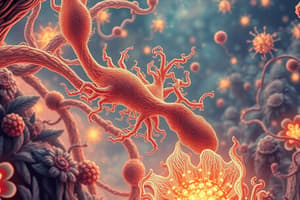Podcast
Questions and Answers
What is the primary focus of molecular biology?
What is the primary focus of molecular biology?
- Understanding the structure and function of biological molecules (correct)
- Analyzing geological formations and rock layers
- Exploring weather patterns and atmospheric conditions
- Studying ocean ecosystems and marine life
Which field of biology investigates the basic functional units of life?
Which field of biology investigates the basic functional units of life?
- Cell biology (correct)
- Botany
- Zoology
- Ecology
What does genetics primarily study?
What does genetics primarily study?
- Effects of climate change on ecosystems
- Transmission and regulation of genetic information (correct)
- Atmospheric pressure variations
- Social behavior of organisms
How does biology contribute to our understanding of life processes?
How does biology contribute to our understanding of life processes?
Which branch of biology has revolutionized our understanding of genetic information?
Which branch of biology has revolutionized our understanding of genetic information?
What aspect of life does cell biology focus on?
What aspect of life does cell biology focus on?
What is the focus of Ecology as mentioned in the text?
What is the focus of Ecology as mentioned in the text?
Which discovery laid the foundation for understanding genetics, molecular biology, and life's origins?
Which discovery laid the foundation for understanding genetics, molecular biology, and life's origins?
What is the main aim of The human genome project as mentioned in the text?
What is the main aim of The human genome project as mentioned in the text?
Which technology allows researchers to edit the DNA of living organisms with unprecedented precision?
Which technology allows researchers to edit the DNA of living organisms with unprecedented precision?
What classification provided a fundamental framework for understanding evolutionary relationships among organisms?
What classification provided a fundamental framework for understanding evolutionary relationships among organisms?
What continues to expand our understanding of life's processes and the natural world according to the text?
What continues to expand our understanding of life's processes and the natural world according to the text?
Flashcards are hidden until you start studying
Study Notes
Science: Exploring the Building Blocks of Reality
Science is a vast and ever-expanding field of inquiry, driven by our natural curiosity and desire to understand the world around us. In this exploration, we will delve into the realm of biology, one of the many branches of science that helps us unravel the mysteries of life.
Biology: The Study of Life
Biology is the scientific investigation of living organisms, their structure, function, growth, evolution, and distribution. It is a highly interdisciplinary field that combines chemistry, physics, and mathematics to provide a comprehensive understanding of life's processes.
Biology is divided into several subfields, such as:
-
Molecular biology: This branch focuses on the structure, function, and interactions of biological molecules like DNA, proteins, and lipids. It has revolutionized our understanding of genetic information, cellular processes, and disease mechanisms.
-
Cell biology: This field examines the basic functional units of life, the cell, and its components. From exploring cellular structures like mitochondria, chloroplasts, and cell membranes to studying the dynamic processes that occur within cells, cell biology brings together the molecular and organismal levels of life.
-
Genetics: This branch investigates the transmission, expression, and regulation of genetic information. It has led to a deeper understanding of how genetic traits are inherited and how they contribute to the development and function of organisms.
-
Ecology: This field examines the interactions among organisms and their environment. It includes the study of populations, communities, ecosystems, and the relationships between organisms and their environment.
-
Evolutionary biology: This branch focuses on the mechanisms that drive evolutionary change and the processes that shape the patterns of biodiversity observed in the natural world.
Biological Discoveries and Advances
-
The double helix: The discovery of DNA's double helix structure by James Watson, Francis Crick, and Rosalind Franklin marked a pivotal moment in biology. This discovery laid the foundation for our understanding of genetics, molecular biology, and life's origins.
-
Central dogma of molecular biology: This principle states that genetic information flows from DNA to RNA to proteins. It provides a framework for understanding the process of gene expression and the central role of DNA in living organisms.
-
The human genome project: This ambitious project, initiated in 1990, aimed to sequence the entire human genome. The completion of this project in 2003 has provided valuable insights into human genetics, disease mechanisms, and evolution.
-
The CRISPR-Cas9 gene editing system: This groundbreaking technology, based on a bacterial defense mechanism, allows researchers to edit the DNA of living organisms with unprecedented precision. It holds great promise for applications in gene therapy, crop improvement, and understanding the basic principles of genetics.
-
The discovery of prokaryotes and eukaryotes: The classification of organisms into prokaryotes (such as bacteria) and eukaryotes (such as animals, plants, and fungi) has provided a fundamental framework for understanding the evolutionary relationships among organisms.
Final Thoughts
Biology, as a part of science, continues to expand our understanding of life's processes and the natural world around us. The discoveries and advances in this field have led to a richer, more nuanced understanding of life's complexity and beauty. As we delve deeper into the mysteries of life, we will undoubtedly discover new wonders and develop innovative technologies to improve our lives and the world around us. So, let us continue to explore, learn, and discover the building blocks of reality.
Studying That Suits You
Use AI to generate personalized quizzes and flashcards to suit your learning preferences.



